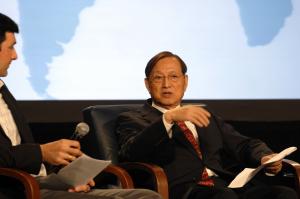With a short crop and drought-impacted prices in 2012, trade servicing has become the top priority for the U.S. Grains Council. For a company like Charoen Pokphand Enterprises Co., Ltd., Taiwan, the opportunity presented by Export Exchange was a great chance to better understand the U.S. production and export system, and to assess the continuing advantages of sourcing U.S. grain and DDGS even in a tough year.
Charoen Pokphand (CP) is one of the largest feed companies in Taiwan, as well as a top poultry producer and swine breeder. “Quality is our life,” said Dr. Willis Cheng, chairman of the company. “In our team, we had discussions [at Export Exchange] about buying some DDGS,” he said. “We are very satisfied… and had direct talk [with U.S. suppliers] about price and what kind of quality we want.”
It is part of the Charoen Pokphand Group, a multi-national company with operations around the world. Cheng said representatives of CP Group from several countries, including China, Indonesia, Thailand and Turkey, were at Export
Cheng said he appreciated not only the Council’s efforts in arranging Export Exchange, but also the related trade missions he and others went on before and after the conference. Cheng’s team travelled extensively, visiting a farm as well as country, river, and shipping elevators. The team particularly appreciated candid discussion of the supply situation and the U.S. drought. “It is very good for us, and we also understand where things will be going,” Cheng said, and he expressed relief that the U.S. crop insurance program will help protect farmers heading into next year.
“For us, we try to buy U.S. corn,” he said, adding that it is a “very good system.” Cheng indicated that his company was very confident in U.S. corn, as the United States is the top global corn and DDGS producer, and quality control and inspection are a big part of that. He noted that many farmers are in their third or fourth generation and that these farmers utilize advanced technology, including precision agriculture driven by the adoption of GPS technology. Cheng was also impressed with U.S. responsiveness and information sharing, nothing that when DDGS became available in Taiwan, the Council arranged to teach the company how to use the product in its different feed rations, which ultimately increased the company’s use of DDGS.
Cheng said the information he learned during farm visits, meeting with suppliers, presentations and other resources organized by the Council helps his company better understand markets and manage risk. He said the Council’s Food 2040 report, which was presented during Export Exchange, provided a good analysis of what may happen in the future and is “a very good guideline” for his operation.
Price is important, but transparency, responsiveness to customers, reliability, and quality information are marketable as well. In a supply constrained year, service is the name of the game for U.S. exports, and Export Exchange 2012 was designed to deliver.


